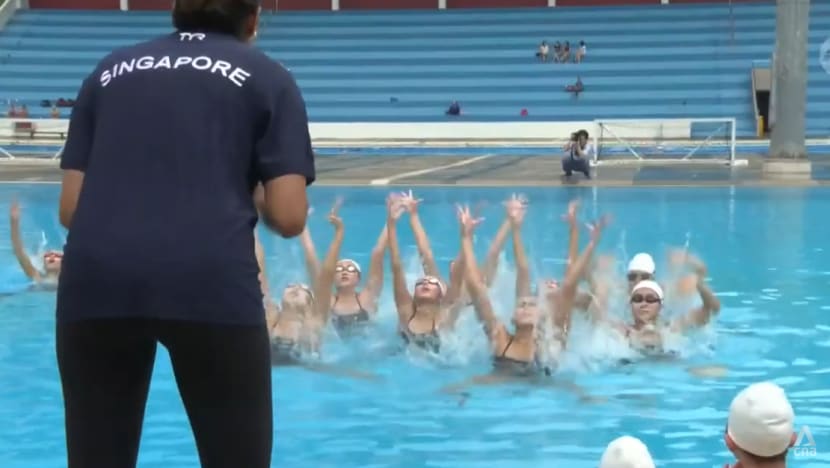Singapore Aquatics rolls out initiatives to tackle misconduct, promote safe sporting environment
The governing body has launched a pool of initiatives, including a mandatory course for all certified coaches on how to conduct their lessons in a manner that is safe from abuse, violence and harassment.

An artistic swimming coaching session in progress.
SINGAPORE: Singapore Aquatics receives about 10 reports of alleged misconduct yearly.
To tackle this issue, the association has launched a pool of initiatives, including a mandatory course for all certified coaches on how to conduct their lessons in a manner that is safe from abuse, violence and harassment.
An upcoming series of workshops will also brief athletes, coaches and administrators on the best practices.
Singapore Aquatics is the national governing body for competitive swimming, diving, synchronised swimming, water polo and open water swimming.
Its Hands Up for Safe Aquatics campaign aims to promote a safe and conducive sporting environment, raise awareness of the types of abuse and harassment which may take place, and educate the community about the importance of safe sport.
This comes as more Singaporeans take up swimming as an activity.
The National Sport Participation Survey, which is conducted annually by Sport Singapore, shows that swimming is among the top five sports that people engage in, and numbers have been steadily increasing.
Singapore Aquatics president Mark Chay said the initiatives are a good way to bring confidence to the community, adding that all five water disciplines under the governing body have young athletes who need to be protected.
He added that aquatic athletes have been receptive to the move.
“It's for their own personal safety. They want to commit to this and they want to be accountable as well, to create a safe environment not only for them but for future generations of athletes,” he said.
CAMPAIGN TO RAISE AWARENESS
Among the national athletes backing the campaign are water polo player Mounisha Devi Manivannan, swimmer Ardi Zulhilmi Azman, artistic swimmer Vivien Tai, diver Max Lee and para swimmer Yip Pin Xiu.
“Safe sport should be cultivated from young so that athletes, parents and coaches know what is appropriate behaviour and what is not,” said Ms Tai.
As coaches may come from different countries with varying backgrounds and cultures, it helps to have a programme in place to provide a framework on what makes a conducive training environment in Singapore, she added.
The initiative could help some victims who may find it difficult to share their experiences of unacceptable behaviour, and encourage them to speak up, she said.
“With this campaign, we hope that athletes can understand that if (they experience) behaviour that is inappropriate, they will be more willing to share with their teammates or bring it up to the association so that they can fix the problem,” Ms Tai said.
National freestyle swimmer Ardi Azman said that mental abuse also needs to be tackled.
“It's not only just the physical aspect but also the mental aspect. For example, body shaming or bad comments can (negatively affect the athletes),” he said.
MANDATORY SAFE SPORT COURSE FOR COACHES
Given the nature of the sport, lines between what is appropriate and what is not can be blurred, especially between coaches and their charges, according to experts.
To make aquatic sports safer for all, local sports authorities are starting with coaches.
Their certification is valid for three years at a time, and those who wish to renew will now have to take a mandatory course on safe sport and abide by the principles in the Safe Sport Unified Code.
The course will include how to communicate in ways that are not abusive, and provide guidelines on keeping the pool a safe environment in the best interests of the athletes.
Mr Chay said it is important for coaches to conduct themselves appropriately and ethically, as they closely interact with athletes who look to them with trust and for guidance.
“Some of our competitive athletes spend four or five hours a day with their coaches. Their interaction is not just a teacher-student kind of a relationship. The coaches also take on a little bit of parenting guidance, the morals and ethics component, as well as a friendship element as well,” he said.
All coaches who practise in public swimming complexes, in clubs and public schools will have to undergo the course, said Mr Chay.
“We're talking about anti-harassment, anti-abuse, anti-sexual harassment, anti-neglect, etc. All coaches have to go through these components to ensure that the environment is conducive for the athletes to explore the different aquatic disciplines and reach their fullest potential,” he added.
He noted that parents are aware of the safe sport component in the Singapore Aquatics coaching programme, and that they can be more decisive and discerning when it comes to looking at the coaching qualifications and selecting a coach for their children.
“Singapore Aquatics’ aim is to make Singapore a world-class aquatics nation,” said Mr Chay.
“To achieve that, we need to put in place an environment where young kids are safe to chase their dreams, where parents are comfortable letting their children pursue sport and where coaches are confident that what they are doing is in the best interest of their athletes.”















